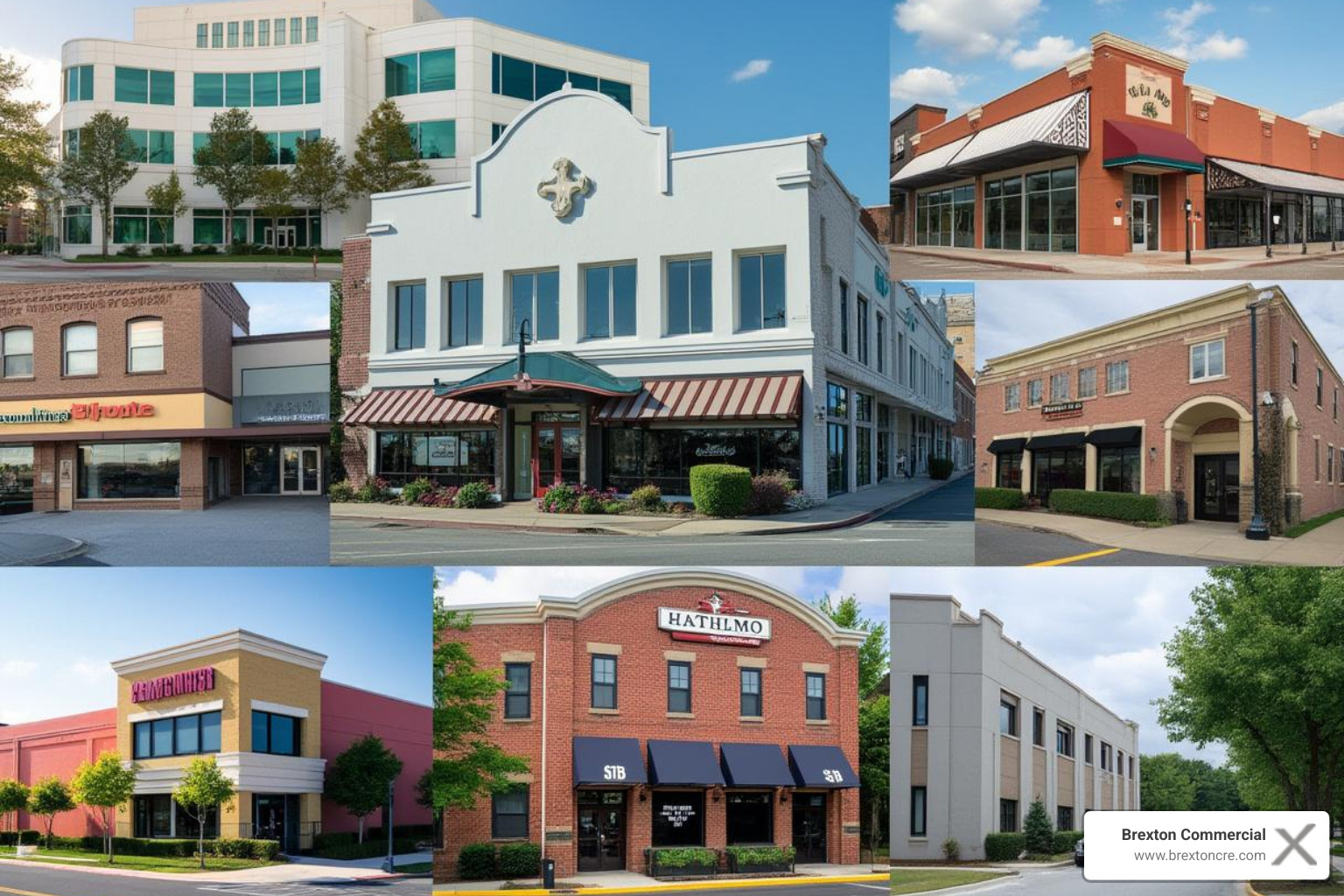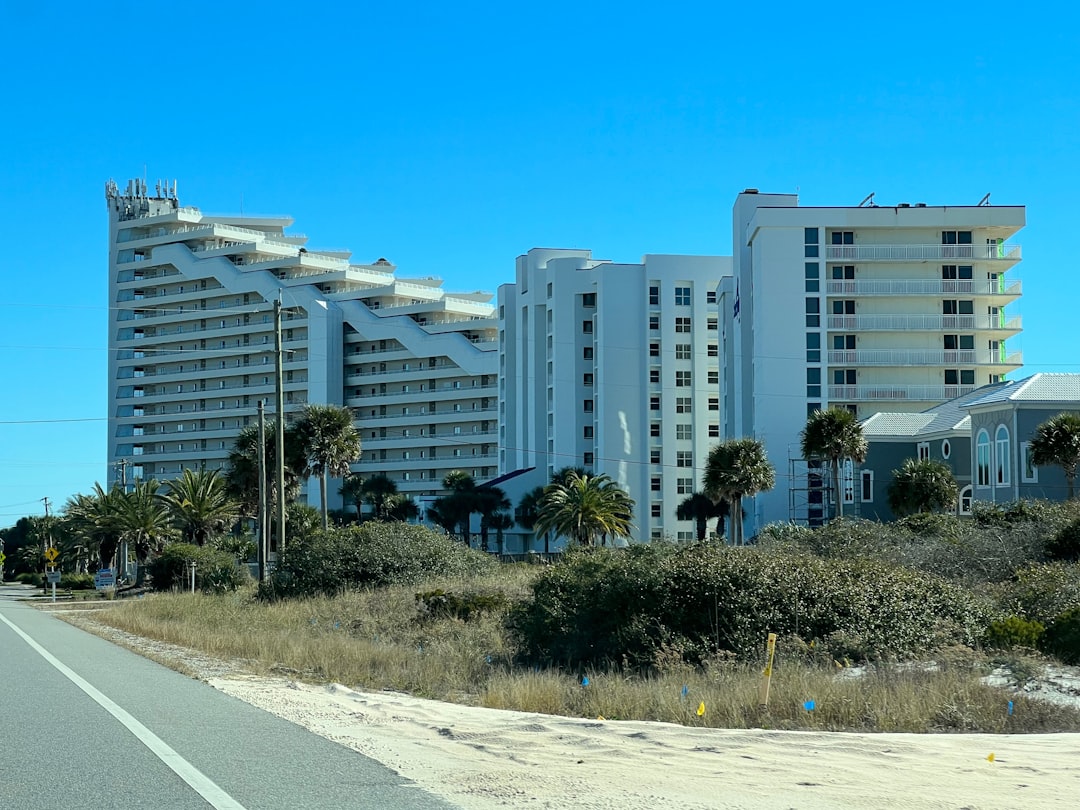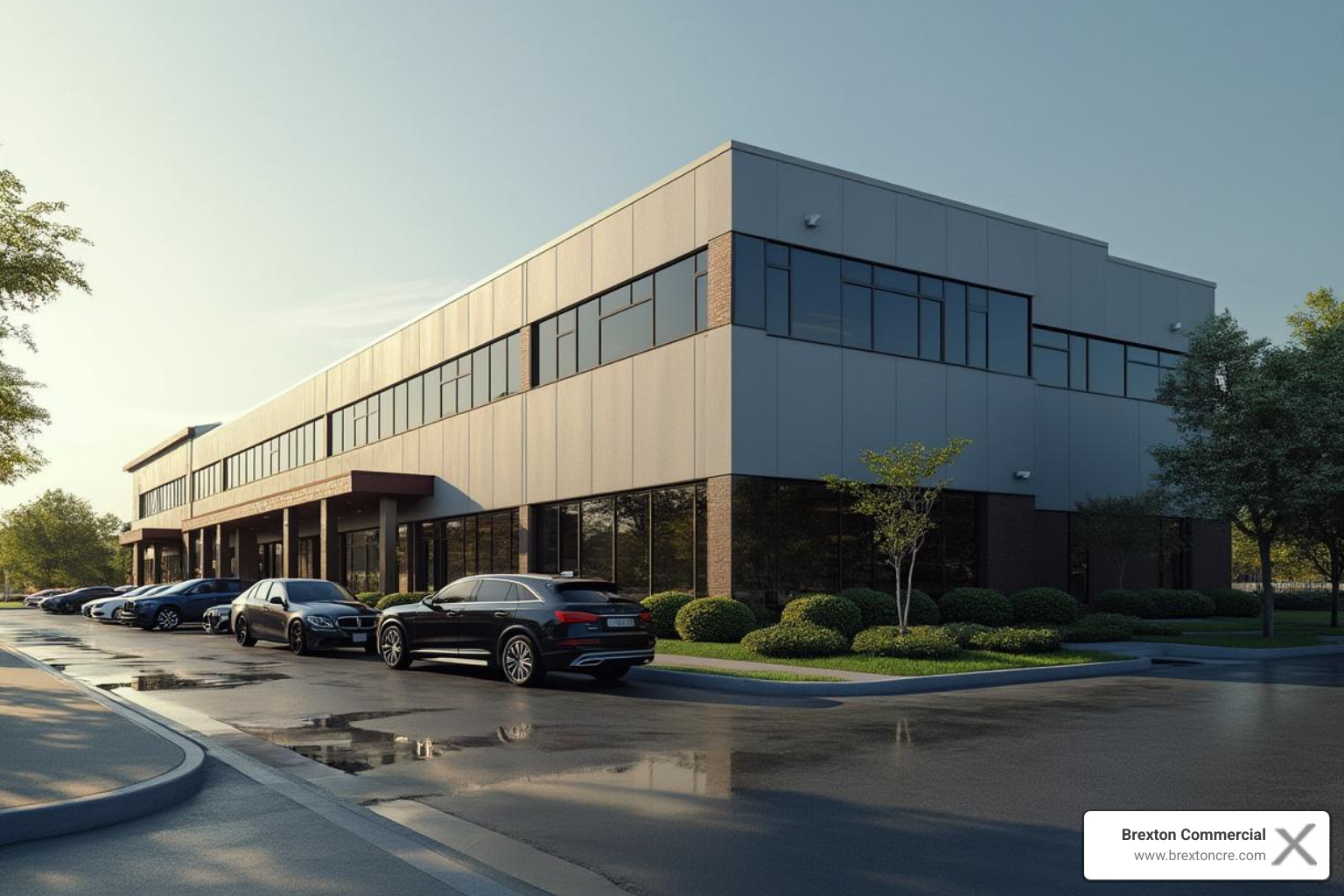What Defines Commercial Real Estate Properties?
Commercial real estate properties are buildings and land used for business activities, rather than residential living. These properties serve many purposes. They can be places where companies operate, where goods are made and stored, or where people shop.
For businesses, finding the right space is key to success. For investors, commercial properties offer a chance to generate income and grow wealth.
Here’s a quick look at what defines commercial real estate and its main types:
- Definition: Real estate used for business, investment, or income-generating purposes.
- Primary Types:
- Office Buildings
- Retail Spaces
- Industrial Facilities
- Multifamily Housing (for investment)
- Special-Purpose Properties
- Land (for commercial development)
Understanding these types is the first step in exploring this dynamic market.
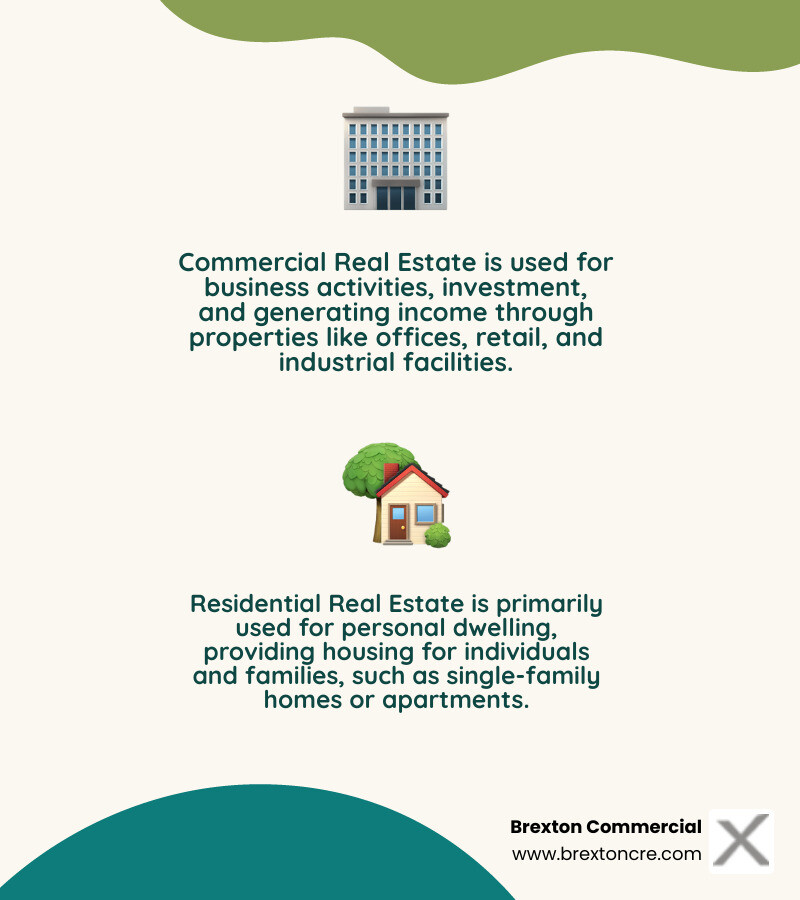
Find more about commercial real estate properties:
The Core Categories of Commercial Real Estate
Commercial real estate properties are more than just buildings; they are the places where businesses thrive, goods are made, and communities connect. Each property type has a unique role, attracting different businesses and investors. From the busy streets of Baltimore to the industrial parks of Pennsylvania, understanding these categories is the first step into the market.
Understanding Office Properties
Office properties are spaces for collaboration, planning, and creation. They range from skyscrapers in city centers to sprawling suburban campuses. We often group them by quality:
- Class A buildings are top-tier: new, modern, in prime locations, and with premium amenities. You'll find these in Washington D.C.'s busy business districts.
- Class B buildings are well-maintained but slightly older, offering quality space at more affordable prices.
- Class C buildings are older and may need updates, providing the most budget-friendly options, often in less central areas.
Office spaces also differ by location. Central Business District (CBD) offices are in the heart of cities like Baltimore, offering prestige and accessibility. In contrast, suburban office parks provide ample parking and a calmer setting, appealing to businesses seeking lower costs.
Specialized office buildings are also common. Medical office buildings (MOBs) are designed for healthcare providers, while tech hubs cater to the unique needs of technology companies, a fast-growing sector across Maryland, D.C., and Virginia.
Looking for your next office space? Explore our current Office Buildings for Sale in the Mid-Atlantic.
Exploring Retail Properties
Retail properties are where we shop, eat, and enjoy ourselves, shaping our local neighborhoods. They are designed for businesses that sell goods and services directly to consumers.
This category includes:
- Shopping centers: Large complexes with multiple stores, often anchored by a major retailer.
- Strip malls: Rows of stores with individual entrances, typically facing a parking lot.
- Stand-alone retail buildings: Individual spots for a single business, like a restaurant or department store.
- Restaurants: Spaces dedicated to dining, from fast-food to fine dining.
- Pop-up shops: Temporary stores that allow businesses to test new markets or capitalize on seasonal demand.
For a retail commercial real estate property, success hinges on location, visibility, and foot traffic. A small retail space in a busy Maryland town can be incredibly valuable due to local customer access. Whether it's a boutique in Annapolis or a restaurant in Richmond, retail properties are vital to our local economies.
Find the perfect spot for your business: Small Retail Space for Rent in Maryland.
The Power of Industrial Real Estate
Industrial real estate is the backbone of our economy, facilitating the movement, storage, and creation of goods. These properties are built for efficiency.
Key types include:
- Warehouses: Large spaces for storing raw materials or finished products.
- Distribution centers: Strategically located facilities for rapid product dispatch, often near major highways or ports like Baltimore's.
- Manufacturing plants: Buildings equipped for product assembly.
- Flex space: A hybrid of office and industrial space, popular for light manufacturing, R&D, or businesses needing a showroom.
- Cold storage: Refrigerated warehouses essential for the food and pharmaceutical industries.
The demand for industrial commercial real estate properties has surged, driven by e-commerce and the need for efficient supply chains. Our region sees high demand for industrial space in D.C. and Maryland, thanks to their strategic locations and access to major transport routes.
Dive deeper into the industrial market: Industrial Real Estate in D.C. and Maryland.
Investing in Multifamily and Special-Purpose Properties
Beyond the core categories, other property types offer unique investment opportunities.
Multifamily housing refers to residential buildings with multiple units owned by an investor for rental income. This includes:
- Apartment buildings: Ranging from duplexes to large high-rise complexes.
- Student housing: Properties built for college students, often near universities in cities like Philadelphia.
- Senior living facilities: Communities designed for older adults with varying levels of care.
These properties generate steady income through rent, making them attractive to investors. Demand for multifamily properties is strong across the Mid-Atlantic due to population growth and shifting demographics.
Special-purpose properties are built for a single, specific use, which can make them highly profitable in their niche:
- Hotels: From budget motels to luxury resorts, generating income from room rentals.
- Self-storage facilities: Low-maintenance and in high demand, offering storage units to individuals and businesses.
- Data centers: Secure, specialized buildings that house computer systems vital to our digital infrastructure.
- Healthcare facilities: Includes hospitals, clinics, and specialized treatment centers beyond MOBs.
Investing in these properties can be complex, but with expert advice, they can offer excellent returns, especially in growth areas like Alexandria, VA.
Explore investment opportunities: Investment Property in Alexandria, VA.
How to Evaluate Commercial Real Estate Properties
Evaluating commercial real estate properties requires a methodical approach that balances financial analysis with real-world market dynamics. Unlike buying a home, commercial property evaluation is driven by numbers and market forces.
For our clients across Maryland, D.C., Virginia, and Pennsylvania, we emphasize that successful commercial real estate investment is part science and part art. The science is in the financial analysis; the art is in understanding the market forces that determine a property's success.
The evaluation process focuses on three key areas: financial analysis, physical characteristics, and location dynamics. Together, they provide a complete picture of a property's potential.
Key Financial Metrics for Investors
Four essential metrics are at the heart of any commercial real estate properties evaluation. They guide smart investment decisions and help avoid costly mistakes.
Capitalization Rate (Cap Rate) is a primary metric, calculated by dividing a property's Net Operating Income by its current market value. For example, a property generating $100,000 in NOI and valued at $1,000,000 has a 10% cap rate. Higher cap rates can signal higher returns but may also indicate increased risk. It allows for comparing different property types, like a warehouse in Baltimore and an office building in Richmond.
Net Operating Income (NOI) is the property's income after all operating expenses are paid but before mortgage payments and income taxes. This figure reveals a property's true day-to-day performance.
Cash-on-Cash Return measures the annual pre-tax cash flow against the total cash invested. This is crucial when using financing, as it shows the return on your actual capital, not the bank's.
Occupancy Rate is a simple but powerful indicator. A high occupancy rate (e.g., 95%) suggests strong demand and good management, while a low rate (e.g., 60%) could be an opportunity or a red flag, requiring local market knowledge to assess.
Here's how these metrics typically play out in our Mid-Atlantic markets:
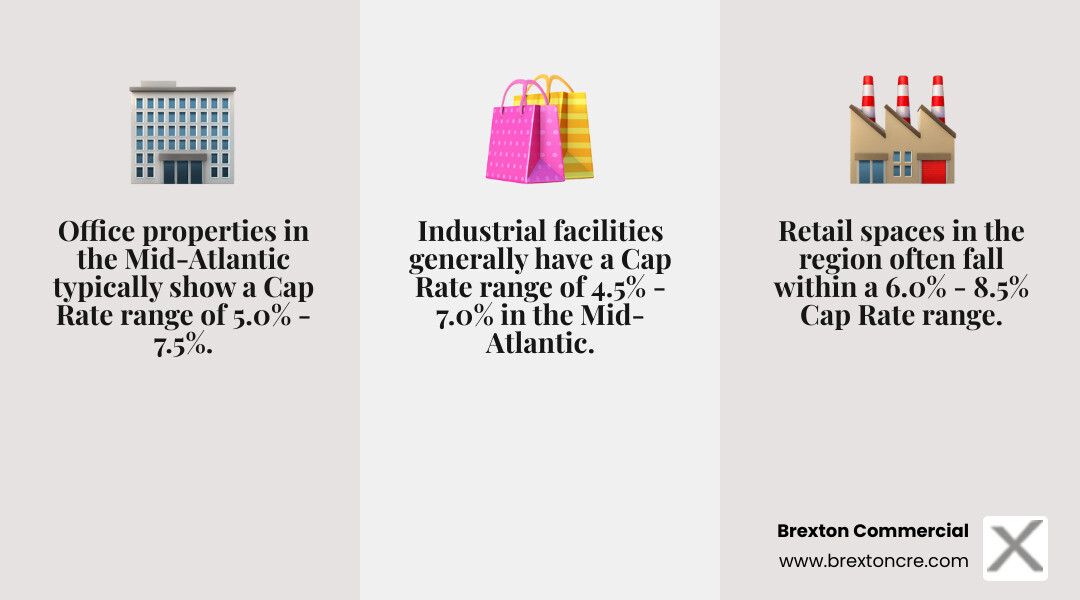
| Property Type | Typical Cap Rate Range (Mid-Atlantic) |
|---|---|
| Office | 5.0% - 7.5% |
| Retail | 6.0% - 8.5% |
| Industrial | 4.5% - 7.0% |
| Multifamily | 4.0% - 6.5% |
These ranges vary with market conditions, location, and property specifics. A prime office building in downtown D.C. will have different metrics than a suburban flex space in Pennsylvania.
Essential Property and Location Analysis
While financial metrics show past performance, physical and location analysis helps predict future potential. This is where we examine the details that distinguish great commercial real estate properties.
Zoning regulations are critical, as they determine how a property can be used (e.g., restaurant, tech startup, distribution center). Understanding zoning is about recognizing opportunities and avoiding roadblocks.
Accessibility is key. For retail, this means traffic counts and visibility. For industrial, it's truck access and proximity to highways or ports. For offices, it's public transit and parking. A property that's hard to reach is hard to lease.
Property condition requires a thorough assessment of the structure, roof, and HVAC systems. A building with deferred maintenance can quickly turn an investment into a money pit.
Tenant quality is paramount for income properties. A strong tenant with a long-term lease provides a stable income stream, making an average building a great investment. We analyze tenant credit, lease terms, and industry stability.
Local economic health, including job growth and population trends, impacts demand for commercial space. A thriving area like Alexandria benefits from government and tech growth, while other markets have different drivers. We constantly monitor these trends across Maryland, D.C., Virginia, and Pennsylvania.
The due diligence process combines these elements into a comprehensive analysis, ensuring every factor is understood in relation to your investment goals.
Considering raw land? The evaluation is even more complex, as you're betting on future potential. Explore opportunities like Land for Sale in Alexandria, VA to see how location analysis is critical for development.
Navigating the Mid-Atlantic Commercial Real Estate Market
The Mid-Atlantic region, including Maryland, D.C., Virginia, and Pennsylvania, is a vibrant and diverse market for commercial real estate properties. Understanding the unique trends and opportunities in each local area is key to success for any buyer, seller, or tenant.
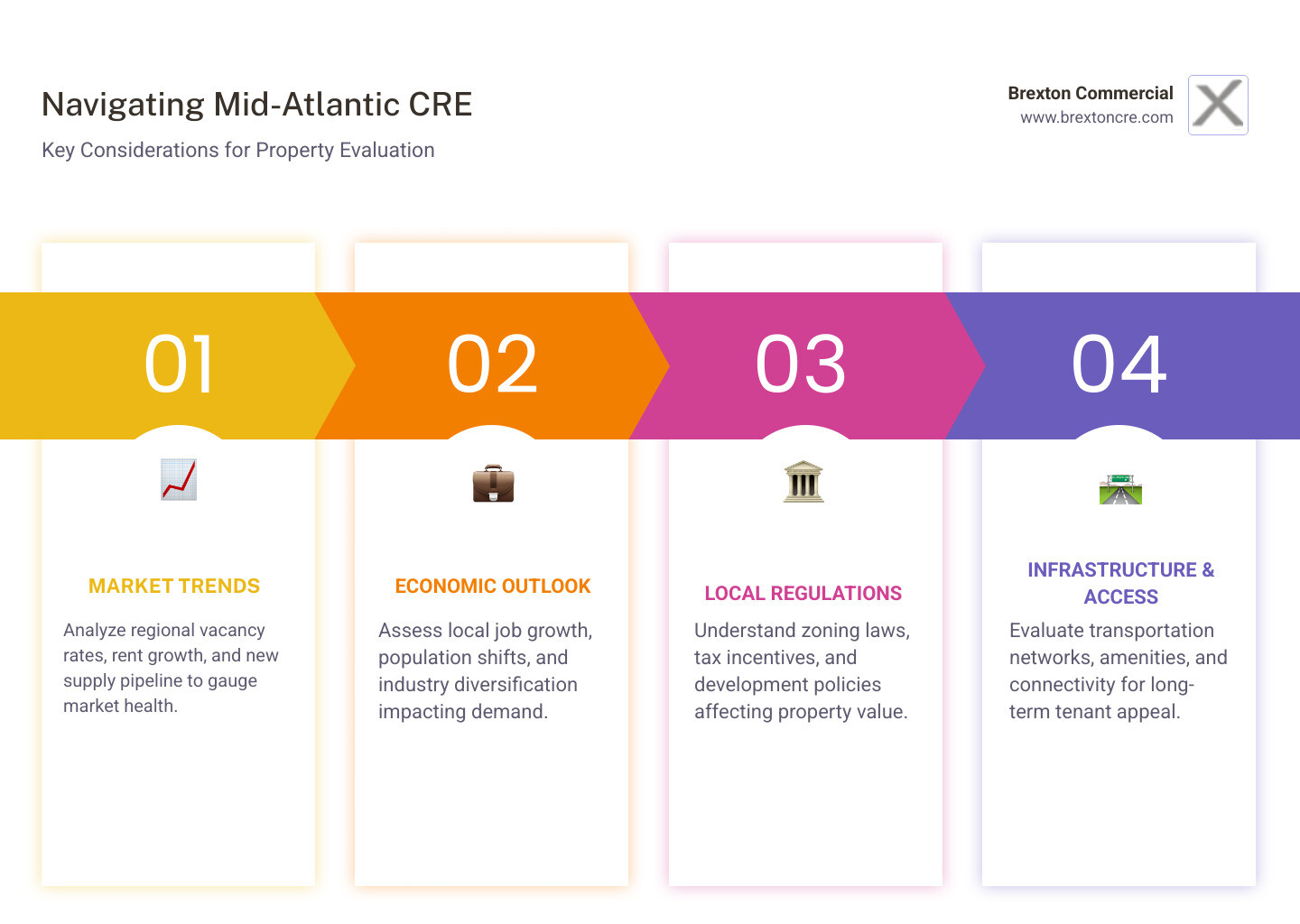
Current Trends in the Mid-Atlantic Region
The Mid-Atlantic commercial real estate sector is shaped by broad economic changes and local trends, which we monitor closely to advise our clients.
Office Market Availability: The Mid-Atlantic office market is evolving. With the rise of hybrid work, businesses now seek flexible spaces with strong amenities in locations that attract employees. Prime spots in Washington D.C. are adapting to these new demands.
Industrial Demand: The industrial sector is booming across the Mid-Atlantic, driven by e-commerce and the need for efficient logistics. Areas near major ports like Baltimore and along key transport routes like I-95 in Maryland and Virginia are seeing exceptionally high demand for warehouses and distribution centers.
Retail Evolution: Retail commercial real estate properties are being reinvented. We're seeing great success with experiential retail, mixed-use developments, and vibrant neighborhood centers across Virginia and Pennsylvania, creating destinations where people want to spend time.
Tech Sector Growth: The tech sector, particularly around the D.C. metro area, is a major driver of demand for office and specialized properties, creating jobs and supporting a thriving commercial real estate ecosystem.
For more detailed insights, check out our Commercial Real Estate Trends and explore Mid-Atlantic Commercial Properties.
How to Find Commercial Real Estate Properties for Sale or Lease
Finding the right commercial real estate properties is manageable with the right strategies.
Online Platforms are a great starting point, allowing you to filter listings by property type (industrial, investment, land, mixed-use, office, or retail), size, and price. However, these listings are often widely known.
This is where Broker Networks add significant value. Professional brokerages like Brexton Commercial have deep industry connections, often uncovering "off-market opportunities" not available to the public. If you "can't find a property that fits your requirements" online, our network can be the key to finding the perfect match.
Direct Outreach and Local Knowledge also yield great results. We actively engage with communities throughout Baltimore, MD, D.C., Virginia, and Pennsylvania, helping us identify potential opportunities before they hit the market.
Here are some top online search strategies to begin your journey:
- Use advanced filters on major listing sites to narrow your options.
- Set up alerts for specific property types and locations.
- Research market reports from trusted advisors to understand current trends.
- Look for properties with detailed data sheets (year built, land size, etc.).
- Consider properties that may require renovation but offer great long-term value.
Ready to start your search? Check out properties in Baltimore, MD and explore listings in the Washington, DC area.
Spotlight on Key Markets
At Brexton Commercial, we are deeply rooted in the Mid-Atlantic and understand the unique opportunities within each local market:
Washington D.C. Commercial Real Estate: A robust market fueled by government, tech, and international organizations, known for high-value office and mixed-use developments.
Baltimore Commercial Real Estate: A revitalizing city with diverse opportunities in industrial, retail, and office sectors, especially around its port and historic neighborhoods.
Virginia Commercial Real Estate for Sale: Offers a wide array of properties, from the tech corridor of Northern Virginia to coastal opportunities in Virginia Beach.
Pennsylvania Commercial Real Estate for Sale and Lease: Presents compelling options with strong industrial and logistics hubs and vibrant urban centers like Philadelphia.
Our local expertise allows us to tailor our services to the specific needs of communities in these locations.
- Washington D.C. Commercial Real Estate
- Baltimore Commercial Real Estate
- Virginia Commercial Real Estate for Sale
- Pennsylvania Commercial Real Estate for Sale and Lease
The Role of a Broker in Your CRE Transaction
Navigating commercial real estate properties can be complex. A commercial real estate services firm acts as your trusted guide, supporting you through every step of the process, from the initial search to the final closing.

Types of Commercial Real Estate Transactions
Commercial real estate transactions come in many forms, and understanding them is essential for both businesses and investors.
Leasing Agreements involve a tenant renting space from a landlord for a set term, typically 3 to 10+ years. The terms can vary significantly, so understanding the lease is key whether you're looking for Commercial Properties for Rent or leasing out your own space.
Property Sales are the outright purchase or sale of a commercial property. This is a major transaction that requires significant due diligence, financing, and legal review for all types of commercial real estate properties.
Investment Purchases are sales focused on acquiring properties primarily for rental income or appreciation. These deals are heavily analyzed using metrics like Cap Rate and ROI.
A powerful tool for investors is the 1031 Exchange, a provision in the U.S. tax code that allows investors to defer capital gains taxes by reinvesting the proceeds from a sale into a similar "like-kind" property within a specific timeframe. This strategy can be instrumental in building wealth through commercial real estate.
Sale-Leasebacks occur when a company sells its property to an investor and immediately leases it back. This allows the business to free up capital while providing the investor with a stable, long-term tenant from day one.
How Brokerage Services Add Value
At Brexton Commercial, our hands-on approach ensures your commercial real estate journey is smooth and successful. Heres how we add value:
Expert Guidance: We translate complex market data and industry jargon into clear, actionable advice custom to you. Our deep knowledge of the Mid-Atlantic market ensures you are guided wisely.
Market Knowledge: We are constantly monitoring trends, values, and opportunities in Baltimore, MD, D.C., Virginia, and Pennsylvania. This includes access to "off-market opportunities" not publicly advertised.
Negotiation: As your advocate, we work to secure the best possible terms for your lease or purchase, leveraging our experience to achieve superior results.
Transaction Management: We manage the entire process, from property tours and due diligence to financing and closing. This saves you time, reduces stress, and helps avoid potential pitfalls.
Tenant Representation: For businesses seeking space, we help find the ideal location and negotiate lease terms that align with your operational needs.
Landlord Representation: For property owners, we market your commercial real estate properties, find qualified tenants, and negotiate leases that maximize your returns.
Investment Advisory: We provide investors with strategic advice on acquiring, selling, and managing property portfolios to meet financial goals.
Consulting Services: Beyond transactions, we offer market analysis, feasibility studies, and advice on property management strategies.
Our primary goal is to create tangible value for our clients by working collaboratively to find solutions that deliver positive results for you and the communities we serve.
For more insights and to see how we can help you, visit More insights on our blog.
Conclusion
Understanding commercial real estate properties opens the door to significant opportunities, whether you're finding a home for your business or building an investment portfolio.
Throughout this guide, we've covered the primary property types in the Mid-Atlantic market. Office buildings in downtown D.C., retail properties in Maryland and Virginia, and industrial facilities all serve unique and vital roles in our economy.
We've also explored multifamily and special-purpose properties—like apartment buildings and hotels—that meet specific community needs while offering solid returns for investors.
Financial metrics like Cap Rate and NOI are just as important as a property's physical attributes. Factors such as location, zoning, and tenant quality determine long-term success in markets from Baltimore's revitalized neighborhoods to Pennsylvania's industrial corridors.
Finding the right commercial real estate properties requires a strategic approach. While online platforms are a good start, the best opportunities are often found through professional networks and local expertise. A knowledgeable broker is invaluable—we know the markets, the key players, and the opportunities that aren't publicly listed.
At Brexton Commercial, we provide every client with personalized attention and expert guidance. The Mid-Atlantic region is our home, and we understand the unique character of each market, from the tech growth in Northern Virginia to the logistics boom around Baltimore's port.
With the right team supporting you, your commercial real estate journey can be a straightforward path to achieving your business and financial goals.
Ready to explore what the Mid-Atlantic has to offer? Explore commercial real estate opportunities in Virginia Beach and find how we can help you succeed.

